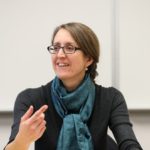In view of the Cartesian separation between res extensa and rex cogitans that continues to shape our civilization, philosopher Robert Spaemann diagnosed a blind spot in modern science. “What gets lost in this separation, what cannot be thought anymore,” Spaemann observes, “is: life. Life is essentially withinness and withoutness, both interiority and exteriority, at once being-for-itself and being-in-relation-to another.” This course seeks to reclaim some of the best recent and contemporary thought concerning the meaning of “life” and its relation to personhood, particularly in the face of the encroachments of technology. Readings by Spaemann, John Paul II, Benedict XVI/ Ratzinger, Scola, Jonas, Talbott, and others will serve as a foundation for elucidating the theological and anthropological significance of being alive in conversation with recent philosophy of biology. On the basis of this groundwork, several bioethical questions will be considered at the end of the course.
Selected Texts
Craig Holdrege, Genetics and the Manipulation of Life: The Forgotten Factor of Context.
Hans Jonas, The Phenomenon of Life: Toward a Philosophical Biology.
Leon Kass, Toward a More Natural Science: Biology and Human Affairs.
Liza Mundy, Everything Conceivable: How Assisted Reproduction Is Changing Our World.
Faculty

Lesley Rice
Assistant Professor of Bioethics
Dr. Rice received her doctorate in theology from the Pontifical John Paul II Institute with a dissertation on contemporary Catholic thought concerning biotechnology and the beginning of life. Her research concerns the history and philosophy of biology, the character of biological knowing, and the cultural and anthropological significance of biotechnologies.
Learn More